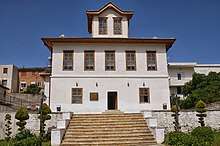Congress of Lushnjë
The Congress of Lushnjë (Albanian: Kongresi i Lushnjës) was a conference of Albanian political leaders held from January 28 to January 31, 1920 in Lushnjë, Albania.[1]

Its objective was to deal with the issues arising from the military control of the country by mainly Italian and secondarily French troops and its political leadership by the pro-Italian Durrës-based government. Held in the residence of Kaso Fuga it was attended by 56 delegates from Albania, adjacent Albanian-inhabited territories and representatives of Albanian emigrant colonies.
Aqif Elbasani was elected president of the congress and Ferit Vokopola secretary. The congress declared the Durrës government invalid and formed a new cabinet under Sulejman Delvina. The new government consisted of the High Council (Albanian: Këshilli i Lartë) the National Council (Albanian: Këshilli Kombëtar). The last decision of the congress was the designation of Tiranë as the new capital of Albania. The congress's decisions would eventually lead a few months later to the Vlora War and as a result to the total withdrawal of the Italian army from Albania and the final affirmation of the country's territorial integrity in 1921. The building where it was held became a museum in 1970.
Background
Preparations
Participants
Members of the initiatory commission are listed below: [2]
- Besim Nuri
- Ferit Vokopola
- Ibrahim Karbunara
- Taullah Sinani
- Emin Vokopola
- Llazar Bozo
- Nebi Sefa
- Qemal Mullai
- Zija Mullai
- Mustafa Vokopola
- Eshref Frasheri
- Jonuz Sefa
- Bajram Haxhiu
- Skënder Pojani
- Kadri Jenisheri
- Teki Libohova
- Filip Papajani
- Abedin Nepravishta
- Jakov Bozo
- Andrea Papaj
- Qerim Arapi
- Rasim Hoxha
- Arif Kurti
- Muntar Luarasi
- Reshat Shazivari
- Abdyl Aziz
- Hasan Islami Like
- Hamit Xheka
Event

Decisions
The Congress was also concerned with the Government of Durrës that had the backing of the invading Italian army. It was alleged that Abdyl Ypi, the initiator of the Congress, had been assassinated by members of the Government of Durrës, who wanted to scare off the other delegates to the Congress. During its first session, the Congress decided unanimously on the downing of the Government of Durrës and the organization of armed against the Italian forces that were in control of part of southern Albania. The High Council was made up of Luigj Bumçi, Aqif Pashë Elbasani, Abdi Toptani, and Mihal Turtulli who would perform the function of the leaders of the new Albanian state, whereas the National Council would function as the Parliament. The congress's decisions would eventually lead a few months later to the Vlora War and as a result to the total withdrawal of the Italian army from Albania.
Aftermath
Legacy
Cabinet
- Sulejman Delvina, Prime Minister
- Ahmet Zogu – Minister of Internal Affairs
- Mehmed Konica – Minister of Foreign Affairs
- Kadri Prishtina – Minister of Justice
- Ndoc Çoba – Minister of Finance
- Sotir Peçi – Minister of Education
- Ali Riza Kolonja – Minister of War
- Eshref Frashëri – General Director of Public Works
- Idhomen Kosturi – General Director of the Post-Telegraph Agency.
References
- Pearson, Owen (2004). Albania in the twentieth century: a history. I.B.Tauris. p. 138. ISBN 978-1-84511-013-0. Retrieved 24 December 2011.
- Elsie, Robert (2013). Biographical Dictionary of Albanian History. New York: I.B. Tauris. p. 5.